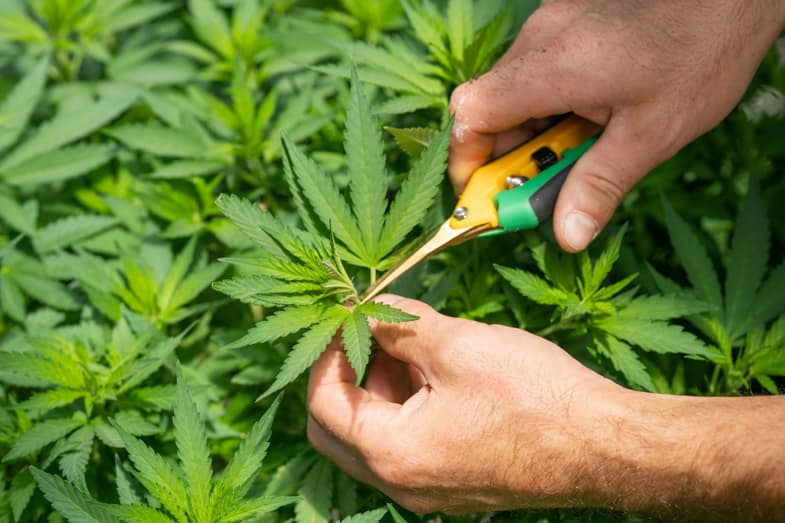Published on: 03/05/2024
Brief overview of what CBD oil is, what the effects are for our body and how long they last
Welcome to this new article in which we are going to explore what CBD oil is, why it is so popular and the benefits it can give our body.
We will find out how long afterwards CBD oil has an effect on our organism and how long these effects last. By the end of the reading we will know more about this natural oil produced by the cannabis plant that so many have started using! Let’s start this exploratory journey together. Happy reading!
What is CBD oil?
CBD oil has gained a great deal of notoriety in recent years due to the countless therapeutic properties that we often hear about and which are mainly recognised by science and medical research.
But where does this oil come from? It is a natural extract derived from the cannabis plant of the Sativa variety.
CBD is a cannabinoid, one of several chemical compounds found in hemp.
Cannabis Sativa is characterised by low levels of THC, the psychoactive substance commonly associated with marijuana. CBD is natural and has such negligible levels of THC that it does not generate any psychotropic effects in its users.
This is one of the reasons why CBD is legal in the UK, albeit with some important conditions. In fact, CBD must be extracted from legally grown industrial cannabis that contains no more than 0.2% THC so that in the finished product this percentage drops to 0.01%.
This means, let it be clear, that CBD is legal, as it has no psychoactive properties.
CBD oil therefore stands out as a non-psychoactive compound and has therefore found favour with the scientific and medical community. Due to its potential health benefits for the body, it has also found approval from the authorities in the UK.


How does it affect our bodies?
CBD oil comes in different concentrations and can be taken in various forms, such as tinctures, edible capsules and even creams (more on this later in the article).
What we must keep in mind is how its active ingredient, CBD, interacts with our organism.
CBD cannabinol acts with one of the most important biological systems: the endocannabinoid system. This is composed of a complex network of neurotransmitters, receptors and enzymes that together regulate the functioning of various functions in our body.
We can think of the human endocannabinoid system as an internal apparatus capable of watching and regulating the body’s internal balances against external or internal stimuli that may be a threat.
The endocannabinoid system is in fact responsible, with its receptors and neurotransmitters, for the regulation of vital functions of our body such as sleep, appetite, pain and the immune system in general, to name a few.
This system reacts to stimulations that may be external or internal to the body. For example, wounds and bacteria are internal to our body, while pollution and air temperature or UV rays are external.
Both stimulate our endocannabinoid system which is activated by producing endogenous cannabinoids.
CBD, on the other hand, is an external cannabinoid that can be introduced in various forms. It is able to interact with the body, helping to balance it in the same way as an internal cannabinoid.
Read also: Is hashish stronger than weed?
The benefits of CBD
We have mentioned how CBD oil is an exogenous cannabinoid as it is introduced from outside and how it is able to interact with our endocannabinoid system.
There are several benefits that the use of CBD can give our body, let’s now see what the main ones are.
Among the best known benefits of this natural cannabinoid is its anxiolytic ability. CBD is indeed able to calm and relax our central nervous system, as if to instil tranquillity.
In these times when we are always in a hurry, chasing after goals and deadlines, knowing that there is an element in nature that can calm us down is of great importance to more and more people.
For this reason, it is often useful for those suffering from anxiety and those seeking relief from stress. It is frequently consumed by those who suffer from insomnia problems and we know how crucial sleep and rest is for being receptive and ready during the working day.
In this, CBD is to all intents and purposes a good regulator of the sleep-wake rhythm.
Another benefit of CBD oil is its pain-relieving effects. Indeed, it is able to alleviate the symptomatic pain of certain diseases, such as the muscle spasms of multiple sclerosis.
Linked to this natural benefit we have its anti-inflammatory power: by acting on receptors of the endocannibonoid system, it is able to reduce inflammation in the body, helping to curb the risk of developing related diseases, such as arthritis.
Let us add that recent studies also suggest CBD for its beneficial effects in reducing symptoms related to diseases such as Alzheimer’s and Parkinson’s. In short, cannabidiol has a very broad spectrum of action, from calming anxiety to soothing pain and reducing inflammation.
CBD is undoubtedly a useful ally of our immune system.
Last but not least, it has benefits as a natural antioxidant: it acts in the reduction of free radicals responsible for our body’s ageing.
CBD is rich in essential fats and as such is an excellent and much sought-after natural organic moisturiser for skin and hair. Not bad, right?
Having reviewed, without claiming to be exhaustive, what are the natural benefits of CBD oil, let’s see how we can utilise all these benefits for our body.
From the way we use cannabidiol, we will better understand how long it is able to generate effects on our organism and, approximately, for how long.
How is CBD taken?
The main and substantial distinction between the various products is essentially related to the form of presentation of CBD oil, which influences how it is administered.
The choice of how to use CBD depends mainly on individual preferences, the need for rapid absorption, the desired efficacy, and the type of relief the person is seeking.
Regardless of the legality or non-legality factor related to the use of this natural cannabinoid, it is crucial to reiterate that consulting a physician before any consumption is necessary for one’s health.
Each mode of CBD intake causes different effects over time. Here are the main modes of administration:
- CBD oil and tinctures: these are the most common form and are taken orally, often with a dropper under the tongue (sublingual) for faster absorption.
- Capsules and pills: offer a more precise method and tend to be used by those accustomed to common medications.
- So-called edibles: we have a very varied and diverse range of products. Hard or gummy candies, chocolates or CBD-based drinks. They are a particularly popular version for those who want to take the cannabinoid in a ‘discreet’ way, away from curious eyes.
- CBD crystals: are a white or slightly yellow, sugar-like crystalline powder that can be ingested. The crystals represent the purest form of cannabidiol.
- Vapourisation and use of electronic cigarettes: in this way we inhale the vapour and the CBD it contains.
- Topical creams and ointments: these are applied to the skin to relieve localised pain and inflammation. They are often used by athletes to alleviate muscle and joint discomfort.
- Ointments: this type of administration promotes a gradual and steady release through the skin over time. It is considered ideal especially for chronic pain.
We have seen how there is a wide variety on offer in the way CBD is administered. Now let’s look at how these different modes of intake can influence the time by which the effects of CBD occur in our bodies.


After how long does CBD oil take effect?
The modes of administration influence the timing and effects that CBD oil can have on the body. A very important clarification must be made: the timing and duration vary from individual to individual. They depend on each organism’s ability to react.
Having said this, however, there are some rough timeframes that we can take as an indication.
With an administration via the oral or sublingual route, i.e. via the mucous membrane of the mouth, the first effects will be felt within 15 minutes, maximum within 60 minutes, and these will last for about 4-6 hours. This is the case for oils and tinctures.
By inhalation through vapourisers, on the other hand, the effects will already be felt within a few minutes.
This is because the interaction with the body occurs almost immediately. The effects of this administration will last approximately 2-4 hours.
Capsules and edibles when ingested interact with the body once they reach the digestive system.
One will have to wait about thirty minutes to notice any benefit, but the effects in this case will be longer lasting than in other forms of administration. They can last from a minimum of 6 to a maximum of 8 hours.
Some recommend, precisely in order to prolong the effect, eating before intake and possibly fatty foods to help lengthen the time.
When using creams or ointments, there is localised relief within 15-20 minutes, with relief that also lasts for several hours after application.
If, on the other hand, patches are used, there will be a gradual release after 15 minutes that will last, depending on the CBD concentration, for several hours. Patches are used by those with chronic pain because of their ease of use and the prolonged relief effects.
In short, depending on the need, one will choose the right CBD usage mode.
For alleviating panic attacks, inhalation is usually preferred; while for treating insomnia, sub-lingual administration will be more effective, with experts recommending applying CBD oil under the tongue half an hour before bedtime.
The side effects of CBD
CBD is generally considered safe and well tolerated by most people. There are a few undesirable effects that depend on the individual organism, the state of health of the body, as well as the dosage and mode of administration.
Let us briefly review some of these undesirable effects:
- you may experience fatigue, drowsiness and a general feeling of tiredness, especially after taking high doses;
- changes in appetite may occur;
- dryness of the mouth also known as “cotton mouth “, due to decreased salivary secretion;
- changes in blood pressure and possible dizziness;
- diarrhoea: this occurs following high dosages or is a symptom of the body’s adaptation to CBD.
These undesirable effects can occur, but do not necessarily have to occur. When using CBD, it is a good idea to start with low and gradual doses precisely in order to understand the body’s reactions. This will make it easier for the body to adapt to the external cannabinoid.
Read also: What happens if you smoke CBD flowers?
Conclusion
We have seen in this article what CBD is, what effects it has on the body and how long these last.
We have focused on the therapeutic uses of cannabidiol and its anti-inflammatory and pain-relieving properties.
We also briefly explained how the endocannabinoid system works and what important physiological processes it regulates. For the sake of completeness, however, we have not overlooked the possible undesirable side effects it may cause.
We always remind you that at present the use of CBD is permitted by law but with certain limitations, but also that legislation is evolving and it is good to have constant and continuous information for the sake of compliance and our health in general.
We invite you to explore our shop where you can find various exclusively legal products such as CBD flowers, we hope to see you soon on Justbob!
Takeaways
- CBD oil is a natural extract derived from the cannabis plant, particularly Cannabis Sativa, which contains negligible levels of THC, making it non-psychoactive and legal in many regions. It has gained popularity due to its therapeutic properties recognized by scientific research.
- CBD interacts with the endocannabinoid system in our body, regulating functions such as sleep, appetite, pain, and immunity. Its therapeutic benefits include anxiety reduction, pain relief, anti-inflammatory effects, and potential alleviation of symptoms related to diseases like Alzheimer’s and Parkinson’s.
- CBD oil can be administered in various forms such as tinctures, capsules, edibles, crystals, vaping, and topical creams. The choice of administration depends on individual preferences, desired efficacy, and the type of relief sought.
- The timing and duration of CBD effects vary depending on the mode of administration. For instance, sublingual intake offers quicker effects within 15-60 minutes, while edibles take longer to kick in but have a longer-lasting effect, ranging from 6 to 8 hours.
- While generally considered safe, CBD may cause some side effects such as fatigue, changes in appetite, dry mouth, changes in blood pressure, and diarrhea, especially at higher doses. Starting with low doses and gradually increasing is recommended to understand individual reactions.
FAQ
What is CBD oil?
CBD oil is a natural extract derived from the cannabis plant, specifically Cannabis Sativa. It contains negligible levels of THC, making it non-psychoactive and legal in many regions.
How does CBD oil affect our bodies?
CBD oil interacts with our endocannabinoid system, which regulates various bodily functions such as sleep, appetite, pain, and immunity. It has therapeutic benefits including anxiety reduction, pain relief, anti-inflammatory effects, and potential alleviation of symptoms related to diseases like Alzheimer’s and Parkinson’s.
After how long does CBD oil take effect?
The timing of CBD oil effects varies depending on the mode of administration. For example, sublingual intake offers quicker effects within 15-60 minutes, while edibles take longer to kick in but have a longer-lasting effect, ranging from 6 to 8 hours.









